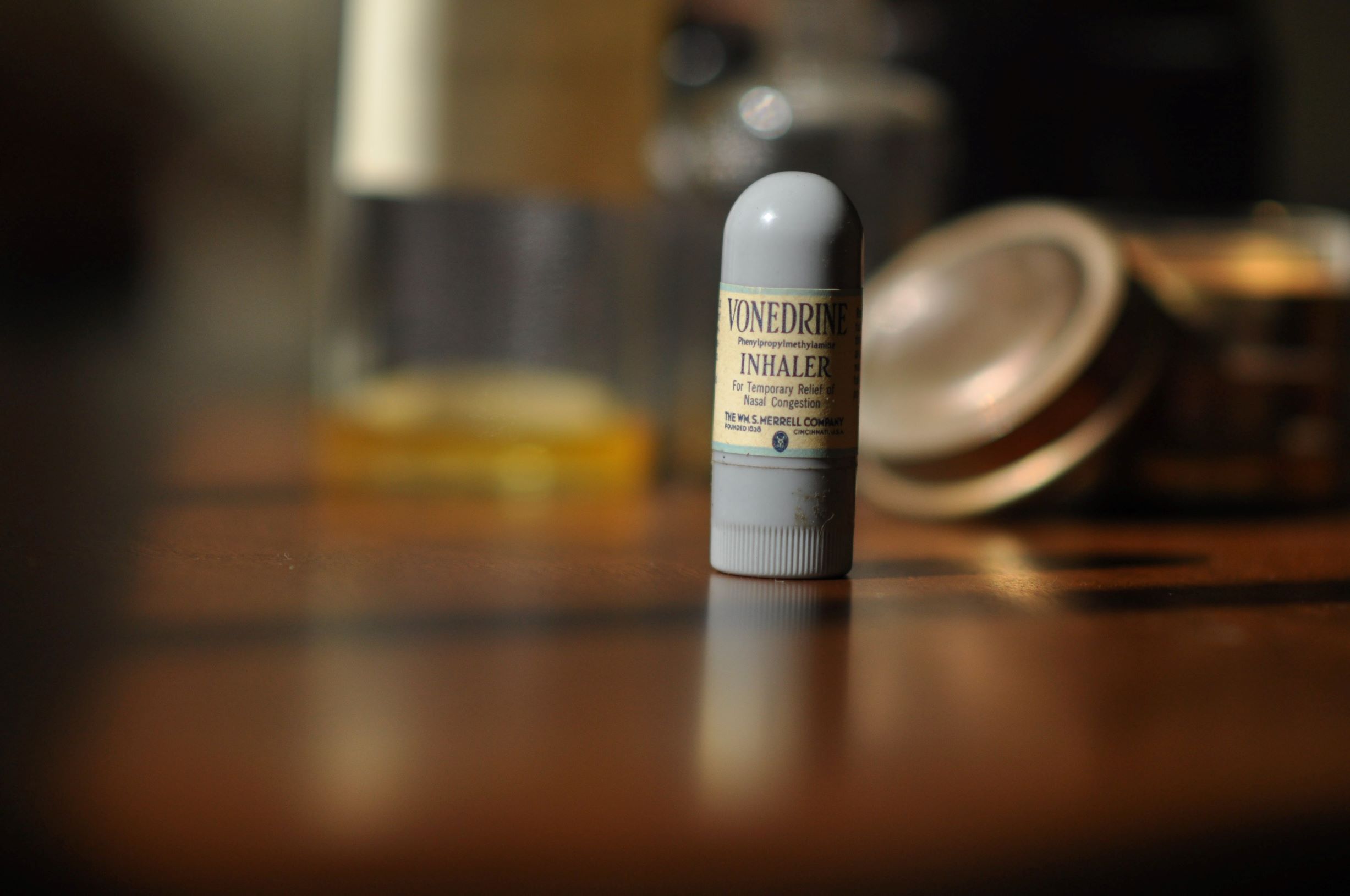WWII-era stimulant drug discovered in weight loss supplements
The stimulant, known as phenpromethamine, was last sold as a nasal inhaler called Vonedrine in the 1940s and 1950s.

Get the world’s most fascinating discoveries delivered straight to your inbox.
You are now subscribed
Your newsletter sign-up was successful
Want to add more newsletters?

Delivered Daily
Daily Newsletter
Sign up for the latest discoveries, groundbreaking research and fascinating breakthroughs that impact you and the wider world direct to your inbox.

Once a week
Life's Little Mysteries
Feed your curiosity with an exclusive mystery every week, solved with science and delivered direct to your inbox before it's seen anywhere else.

Once a week
How It Works
Sign up to our free science & technology newsletter for your weekly fix of fascinating articles, quick quizzes, amazing images, and more

Delivered daily
Space.com Newsletter
Breaking space news, the latest updates on rocket launches, skywatching events and more!

Once a month
Watch This Space
Sign up to our monthly entertainment newsletter to keep up with all our coverage of the latest sci-fi and space movies, tv shows, games and books.

Once a week
Night Sky This Week
Discover this week's must-see night sky events, moon phases, and stunning astrophotos. Sign up for our skywatching newsletter and explore the universe with us!
Join the club
Get full access to premium articles, exclusive features and a growing list of member rewards.
An experimental stimulant drug from the World War II era is showing up in weight loss and sports supplements sold today, according to a new study.
The stimulant, known as phenpromethamine, was last sold as a nasal inhaler called Vonedrine in the 1940s and 1950s, but it has since been withdrawn from the market and has never been approved for oral use, according to the study, published Tuesday (March 23) in the journal Clinical Toxicology. It's also banned from competitive sports by the World Anti-Doping Agency. The new study appears to be the first to confirm the presence of phenpromethamine in supplements, the authors said.
In addition to phenpromethamine, the study identified eight other prohibited stimulants in sports and weight loss supplements, which were often found mixed together in various combinations to create "cocktails" of stimulant drugs that have never been studied in people, the authors said.
Related: Some 'brain-boosting' supplements contain high levels of unapproved drug
"This is really surprising," study lead author Dr. Pieter Cohen, a general internist at the Cambridge Health Alliance and an associate professor of medicine at Harvard Medical School, told Live Science. "Finding nine different experimental prohibited stimulants at the same time was really quite shocking." The authors found as many as four different stimulants in a single supplement.
The risks of consuming these combinations of stimulants is unknown, and these stimulants are not always listed on the product labels, the authors noted.
"The FDA should warn consumers about the presence of cocktails of experimental stimulants in weight loss and sports supplements and take immediate effective action to remove these stimulants from the market," the authors wrote in the study.
Get the world’s most fascinating discoveries delivered straight to your inbox.
Prohibited stimulants
The researchers began their study looking not for phenpromethamine, but for a different stimulant called deterenol. Studies from Europe had found that supplements containing deterenol together with other stimulants were linked with harmful effects in people, including nausea, vomiting, chest pain, cardiac arrest and even sudden death. (Deterenol has never been approved for use in the U.S. and in 2004, the FDA ruled that the stimulant was not permitted in dietary supplements.)
For the study, they analyzed 17 brands of supplements sold in the U.S. that were labeled as containing deterenol or a synonym for the drug. These products were usually marketed as weight loss supplements or sport supplements. (A full list of these supplement brands can be found in the study.)
The researchers found deterenol in 13 of the 17 supplements. The next most commonly detected stimulant was phenpromethamine, present in four of the 17 brands.
Very little data exists on the safety of phenpromethamine. When it was used in the 1940s and 1950s, it was available only as a nasal spray, Cohen said. The effects of taking the drug orally, which is how people would consume it today in a supplement, are unknown. "If you have it concentrated and take it in a pill form, it could have totally different effects," Cohen said.
Phenpromethamine is not the first WWII-era stimulant to show up in dietary supplements. In 2004, after the FDA banned the stimulant ephedra from dietary supplements, manufacturers started adding other experimental stimulants, including 1,3-DMAA, which was previously marketed in 1948 as a nasal inhaler, the authors said. The FDA has since banned 1,3-DMAA from supplements and has issued warnings that it may increase the risk of heart problems.
"As soon as the FDA warns about a stimulant, new ones, close variants of them tend to appear," Cohen said.
So far, the FDA has not issued warnings to consumers about phenpromethamine, according to the study. What's more, scientists at the FDA recently detected deterenol in supplements, publishing their findings in the journal Drug Testing and Analysis in September 2020. But even after this discovery, the agency didn't issue a warning, despite the supplement being prohibited by the agency, Cohen said.
"There's no question that the FDA should have acted as soon as they determined [deterenol] was present," Cohen said. "They should be immediately warning consumers about deterenol; they should be communicating with manufacturers that any supplement containing the stimulant needs to be removed."
Although the FDA may not have warned about deterenol, the agency has warned about weight loss supplements in general. On its website, the FDA says it has "identified an emerging trend" of dietary supplements that contain hidden and potentially harmful active ingredients. "Consumers may unknowingly take products laced with varying quantities of approved prescription drug ingredients, controlled substances, and untested and unstudied pharmaceutically active ingredients," the agency says.
Of the nine stimulants found in the new study, seven — including 1,3-DMAA — have previously been the subject of FDA warnings due to their presence in supplements. This finding agrees with that of a 2018 study by Cohen and colleagues that found that some dietary supplements still contain experimental stimulants years after those stimulants were prohibited by the FDA, Live Science previously reported.
Knowing whether a dietary supplement contains a prohibited stimulant can be difficult because manufacturers may not list the drug on the label, or they may use a synonym for the drug, Cohen said.
But in general, Cohen advises consumers to avoid two categories of dietary supplements — those labeled to say they will help you lose weight and those labeled as pre-workout or muscle-building supplements. (The latter category excludes protein powders, which generally contain amino acids and are not something to worry about, Cohen said.) These categories of supplements cannot be considered safe until two things happen: "We reform the law so the FDA has more enforcement authority; and the FDA begins to effectively enforce the law," Cohen said.
In a statement provided to Live Science, the FDA said it is reviewing the new study. "The FDA is dedicated to advancing our strategic priorities for dietary supplements: safety, product integrity, and informed decision-making. We appreciate studies like this for raising awareness and bringing needed attention to these matters," the statement said.
Originally published on Live Science.

Rachael is a Live Science contributor, and was a former channel editor and senior writer for Live Science between 2010 and 2022. She has a master's degree in journalism from New York University's Science, Health and Environmental Reporting Program. She also holds a B.S. in molecular biology and an M.S. in biology from the University of California, San Diego. Her work has appeared in Scienceline, The Washington Post and Scientific American.
 Live Science Plus
Live Science Plus










